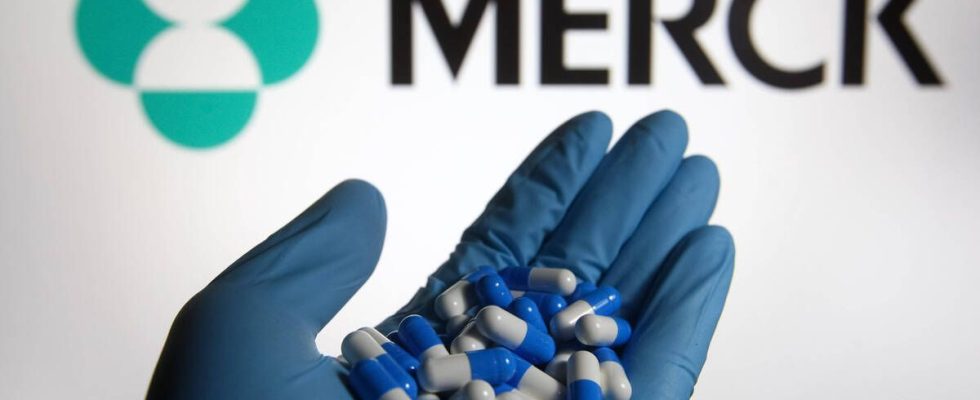However, it had been recommended by the world health organization (WHO). Two years after its launch, does Merck’s anti-Covid pill now risk worsening the pandemic? Researchers claim that this treatment contributes to the emergence of mutations in the virus, with a risk for the moment theoretical: giving rise to dangerous variants. “Treatment with molnupiravir left a visible trace in global sequencing databases” of the virus genome, concludes a study published Monday in the journal Nature.
Molnupiravir is a treatment developed by the American pharmaceutical giant Merck (known internationally as MSD). In 2021, it was the first anti-Covid pill, a notable advance for a pharmaceutical arsenal which until then was only composed of vaccines and treatments requiring complex intravenous administration.
But molnupiravir, sold under the name Lagevrio, quickly became the subject of criticism. These were partly aimed at its limited effectiveness, particularly compared to its major competitor, Pfizer’s Paxlovid, which quickly joined it on the market. Above all, its mode of action has provoked strong reluctance. Unlike other antivirals, such as Paxlovid, Lagevrio acts by integrating directly into the genome of the virus. The goal is to trigger a series of increasingly disordered mutations that ultimately lead to the extinction of the virus in the body.
The High Authority for Health (HAS) had completely ruled it out
Since its launch, researchers have estimated that this mechanism risks promoting the appearance of mutating viruses that can be transmitted from one individual to another. This risk had contributed to a certain reluctance of health authorities such as the American FDA which had only approved molnupiravir by a small majority, or the High Authority of Health (HAS) French, which completely dismissed it.
It is in this context that the study published Monday takes place, while the star of Merck’s pill has already faded in view of its low effectiveness but it still remains widely prescribed in certain countries, particularly in the process of of development. The researchers studied a vast database, called Gisaid, which brings together the genomes of viruses collected from numerous patients around the world. For them, the conclusion is clear: the use of molnupiravir is associated with the appearance of specific mutations.
They noted the appearance of a specific “signature” when the pill began to be prescribed in certain countries. In contrast, it is almost absent from places where the treatment was not approved. In summary, this treatment “can give rise to viruses which have mutated significantly and which remain viable, or even, in certain cases, transmissible,” one of the authors, geneticist Theo Sanderson, explained to AFP.
These findings were rejected by Merck. According to the American laboratory, the study only highlights a correlation without making it possible to assert a cause and effect link between its treatment and these mutations. The authors rely on “circumstantial associations,” the group told AFP.
“In certain difficult cases, it is a medicine that can be very useful”
The fact remains that the study convinces several researchers who did not participate in it, such as virologist Stephen Griffin who praised the work of the British Science Media Center (SMC) as “well carried out and of exceptional importance”. Like the authors of the study, he insists on one point: the mutations identified do not seem, in themselves, to have been particularly dangerous or contagious. “But these results have important implications for the rest of the pandemic,” warns Stephen Griffin. Indeed, any phenomenon that accelerates the mutations of the virus ultimately runs the risk of giving rise to more dangerous variants or, as Omicron was when it first appeared, significantly more transmissible than its predecessors.
In this context, should we stop prescribing molnupiravir? The authors of the study are careful not to comment, remaining on the ground of genetics and referring the health authorities to their responsibilities. And for some researchers, if these results remind us of the need not to prescribe molnupiravir all the time, we should not give it up altogether.
“Of course, you should not systematically take molnupiravir when you are infected” with the coronavirus, concludes infectious disease specialist Chris Butler at the SMC. “But in certain difficult cases, it is a medicine that can be very useful. »

